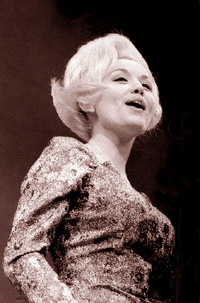 She’s had over 100 hits on the country music charts – including 25 number ones – and more than 40 top ten albums. As a writer, musician, actress, and author, her body of work encompasses everything from the mountain music she grew up around, to Broadway shows.
She’s had over 100 hits on the country music charts – including 25 number ones – and more than 40 top ten albums. As a writer, musician, actress, and author, her body of work encompasses everything from the mountain music she grew up around, to Broadway shows.
Yet, for some potential listeners, Dolly Parton’s brash, larger-than-life personality and amply-endowed figure – she’s described her look as a combination of Mother Goose, Cinderella and the local hooker – makes it hard to appreciate the big picture.
Truth is, she’s an astute performer; behind the artifice lies an uncommonly honest individual. As she once pointed out, “There’s a heart beneath the boobs, and a brain beneath the wig.”
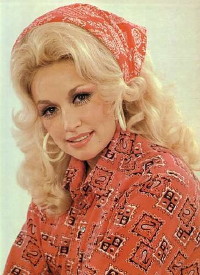 It’s a rags-to-riches story that reads like a dime store novel.
It’s a rags-to-riches story that reads like a dime store novel.
Born in the Great Smoky Mountains of East Tennessee in 1946, Parton was the fourth of a dozen children. Depending on the source, her cash-strapped sharecropper parents paid for her delivery with either a pig or cornmeal. Both sides of the family were musical, and she grew up singing at home and in church. Her maternal grandfather was a fiddle playing preacher, and she’s described her grandmother as the “prayingest, singingest, shoutingest resident of Tater Ridge, Tennessee.”
The area is rich with musical history; folklorists were venturing into the region well into the last century, collecting old English folk songs.
Parton was playing guitar and writing songs at five years old, and appearing regularly on local radio and TV by the time she was ten. The day after graduating from high school – the first in her family to do so – she boarded a Greyhound bus to Nashville, intent on making a name for herself.
She succeeded, and then some.
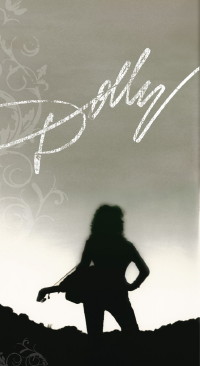
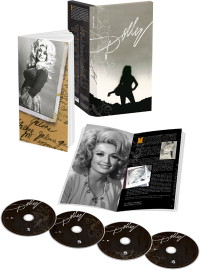
As an overview of Parton’s career, the recently released Dolly is first rate. The four-disc box set – which collects 99 songs and spans five decades – starts even before Nashville, with her debut single from 1959; a pair of tunes she wrote with one uncle, and recorded at another uncle’s studio in Louisiana. ‘Puppy Love;’ in particular, is fascinating; a minute and 41 seconds of rockabilly that brings to mind a pipsqueak version of Wanda Jackson.
The early recordings are a bit a pop potpourri; one track sounds like a forgotten girl group classic, another in the style of Skeeter Davis. Initially, Parton was pushed in a pop direction, even appearing on American Bandstand at one point. It was only after Bill Phillips took her ‘Put It Off Until Tomorrow’ into the Country top ten in 1966 – and scored again with a second Parton cover – that she succeeded in convincing her record label that she should be recording country instead of pop.
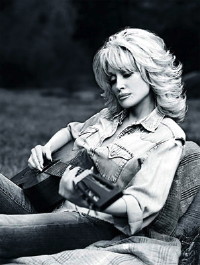 It’s worth noting that – regardless of genre – she was first and foremost a writer. Her canny gift for melodic and lyrical turns of phrase had much in common with the Brill Building writers of the day. Dolly was obviously aware of the hit factory to the north; she recorded an obscure Carole King/Gerry Goffin song; ‘I’ve Known You All My Life,’ in 1965, and when she did cross over to pop for real – on her own terms, almost a decade later – the single that broke her; ‘Here You Come Again’ came from the Brill Building team of Barry Mann and Cynthia Weil.
It’s worth noting that – regardless of genre – she was first and foremost a writer. Her canny gift for melodic and lyrical turns of phrase had much in common with the Brill Building writers of the day. Dolly was obviously aware of the hit factory to the north; she recorded an obscure Carole King/Gerry Goffin song; ‘I’ve Known You All My Life,’ in 1965, and when she did cross over to pop for real – on her own terms, almost a decade later – the single that broke her; ‘Here You Come Again’ came from the Brill Building team of Barry Mann and Cynthia Weil.
Her own songs – narratives, stories of murder, death, betrayal, redemption and faith – came right out of the folk tradition she grew up with.
A prostitute laments leaving her home and first love for the big city In ‘My Blue Ridge Mountain Boy.’ The protagonist in ‘Gypsy, Joe and Me’ contemplates suicide after her dog and the man she loves (“The flower of my soul”) both meet with an early demise.
The grieving parents in ‘Jeannie’s Afraid of the Dark’ honour their only child’s request to leave a nightlight on, despite the fact she has died. Deserted by the father, an unwed girl in 1969’s ‘Down From Dover’ delivers a stillborn daughter; “She knew she’d never have a father’s arms to hold her.”
Out of context, these songs might appear morbid and maudlin, yet each is written and sung with genuine empathy.
Parton was a pioneer at addressing politically sensitive issues: 1967’s ‘Just Because I’m A Woman,’ and 1969’s ‘Just The Way I Am’ tackled female empowerment and double standards years before the nascent woman’s liberation movement hit critical mass.
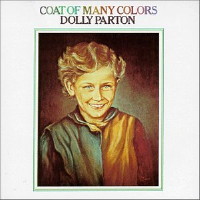 She describes ‘Coat Of Many Colors’ as the song that means the most to her. The tale of a girl mocked by schoolmates for wearing clothing fashioned from discarded fabric is based on real events. Rather than feeling shame, she cherishes her mother’s handiwork – and ability to face poverty with dignity; “as she sewed she told a story from the Bible she had read / About a coat of many colors Joseph wore…”
She describes ‘Coat Of Many Colors’ as the song that means the most to her. The tale of a girl mocked by schoolmates for wearing clothing fashioned from discarded fabric is based on real events. Rather than feeling shame, she cherishes her mother’s handiwork – and ability to face poverty with dignity; “as she sewed she told a story from the Bible she had read / About a coat of many colors Joseph wore…”
In addition to the country hits, Dolly’s songs began to cross over to the pop charts starting in 1974. She went all the way to #1 in 1981, with the title song from her film debut, 9 to 5. The role came after a chance meeting with Jane Fonda, who was convinced Dolly would be a natural in front of the cameras. The film’s success led to additional roles in Steel Magnolias, The Best Little Whorehouse In Texas, and Street Talk.
Film increased her renown, and in 1986, she opened Dollywood, a theme park that celebrates life in the Appalachian Mountains. Currently celebrating its 25th anniversary, the park remains the most popular ticketed tourist attraction in Tennessee, attracting millions of visitors each year.
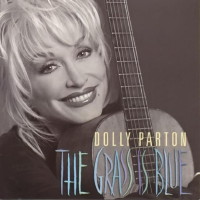 The box stops in the early nineties, but that’s not to imply things were slowing down. Parton enjoyed a creative and critical renaissance by returning to her roots, recording a string of straight-ahead bluegrass efforts starting with 1999’s The Grass Is Blue.
The box stops in the early nineties, but that’s not to imply things were slowing down. Parton enjoyed a creative and critical renaissance by returning to her roots, recording a string of straight-ahead bluegrass efforts starting with 1999’s The Grass Is Blue.
Typically, she was not above bending the rules, even in the most traditional of forms; a bluegrass remake of Led Zeppelin’s ‘Stairway To Heaven’ won kudos from both Jimmy Page and Robert Plant.
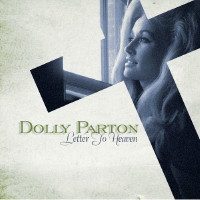 This month brings an unofficial companion to the box. Letter To Heaven: Songs of Faith And Inspiration includes her 1971 gospel effort Golden Streets Of Glory in it’s entirely, along with seven additional recordings from same period.
This month brings an unofficial companion to the box. Letter To Heaven: Songs of Faith And Inspiration includes her 1971 gospel effort Golden Streets Of Glory in it’s entirely, along with seven additional recordings from same period.
The majority of tracks were written by Dolly herself, including ‘Would You Know Him (If You Saw Him),’ a previously unreleased original from the Streets sessions.
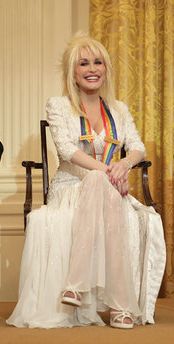
It could be argued that gospel is the music closest to Parton’s heart. She readily identifies herself as a Christian, and the music has been a constant since the very beginning.
At five years old, she wrote her first spiritual; ‘Life Doesn’t Mean That Much To Me’; and she’s covered dozens of traditional gospel numbers over the years, as well as a few CCM classic like Don Francisco’s ‘He’s Alive.’
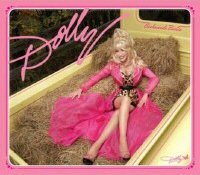 Last year saw her induction into the Gospel Music Association’s Hall of Fame. Her sacred songs – like the rest of her catalogue – are far from formulaic. From the pastoral beauty of ‘God’s Coloring Book,’ to the weightier ‘God Won’t Get You’ (sung from the perspective of a believer struggling to understand why God would allow them fall in love with another’s spouse) to ‘The Seeker,’ Parton looks at faith from a variety of perspectives.
Last year saw her induction into the Gospel Music Association’s Hall of Fame. Her sacred songs – like the rest of her catalogue – are far from formulaic. From the pastoral beauty of ‘God’s Coloring Book,’ to the weightier ‘God Won’t Get You’ (sung from the perspective of a believer struggling to understand why God would allow them fall in love with another’s spouse) to ‘The Seeker,’ Parton looks at faith from a variety of perspectives.
Much like the character she played in Steel Magnolias – who declared; “Honey, God don’t care which church you go, long as you show up” – Dolly has never publically aligned with a specific denomination, and doesn’t hesitate to question the status quo. She simply calls it like she sees it.
 Her latest studio effort, Backwoods Barbie contains a pair of bonafide classics, ‘Better Get To Livin’ and ‘Jesus And Gravity” that work as mini-sermons, offering up advice both practical and theologically correct. Both are featured on Live From London, a new CD/DVD set taken from recent U.K. shows that touch on every part of her career. Like Barbie, Live is released on her own imprint, Dolly Records.
Her latest studio effort, Backwoods Barbie contains a pair of bonafide classics, ‘Better Get To Livin’ and ‘Jesus And Gravity” that work as mini-sermons, offering up advice both practical and theologically correct. Both are featured on Live From London, a new CD/DVD set taken from recent U.K. shows that touch on every part of her career. Like Barbie, Live is released on her own imprint, Dolly Records.
After 75 albums and over 3,000 songs – she’s written as many as twenty in a single day – Parton continues to take on new challenges.
Her first theatrical work, 9 To 5: The Musical opened on Broadway last year, with 16 songs composed specifically for the production.
It wasn’t her idea; she’d never attempted anything on this scale, but when the producers approached, she was game: “I was just dumb enough to say yes.”
The production will tour America later this year, and she’s already at work on a second musical.
© John Cody 2010